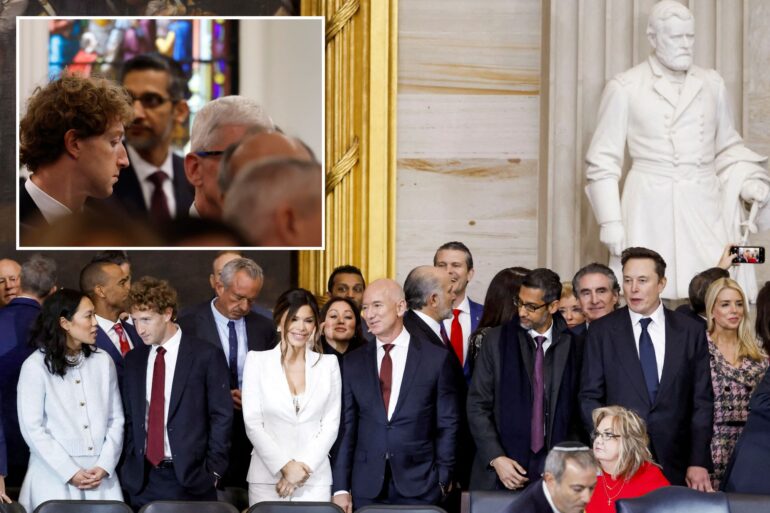🔴 Website 👉 https://u-s-news.com/
Telegram 👉 https://t.me/usnewscom_channel
The most iconic photo of Inauguration 2025 may be the Tech Bros — Mark Zuckerberg, Jeff Bezos, and Tim Cook — accompanying President Trump at Washington’s St. John’s church for Sunday services.
It was a stark contrast to President Biden’s conspiring in 2021 with Big Tech to censor dissent on COVID lab leaks and lockdowns.
And while derided as opportunist obedience by simple-minded critics, the iconic moment may reflect a profound inflection point in American culture.
As leading British historian Tom Holland argues, the West’s unparalleled success over the past three centuries is directly attributable to religion – in particular, the Protestant Reformation of the 16th century and the earlier Hebrew prophets that helped inform it.
It was the Reformation that singularly unshackled the common man from the medieval tyranny of monarchs and Roman popes which, in turn, led to the Western concepts of liberty and individual rights on which the US was modeled.
The Reformation’s “the first shall be last and the last shall be first” egalitarian concept of individual liberty, argues Holland, birthed modernity: The enlightenment, the scientific and industrial revolutions, the French and American revolutions, abolition of slavery and civil rights movements and nearly every other enduring idea that lifted humanity out of poverty and oppression which had been ubiquitous since antiquity.
But since the 1960s, faith has been under attack by the pseudo-intellectual secular theologians of the faculty lounge left who argued that institutional religion was anachronistic, sectarian, patriarchal, or otherwise oppressive.
As intellectual descendants of Franz Fanon and Herbert Marcuse — forerunners to the anti-Western left — these academics unsheathed new pedagogies of deconstructionism (getting rid of old ideas and institutions) not unlike Chairman Mao’s effort to rid mid-century China of the “four olds.”
This secular liturgy eventually formed the ideological basis of the post-modern progressive left: secure borders are masquerading bigotry; a new multibillion-dollar for-profit industry marketing irreversible gender-altering drugs and surgeries to minors, often without parental consent or proper scientific backing (notwithstanding a cleric’s recent chiding of Trump), is somehow enlightened; equal opportunity must be replaced with equal results among identity groups (“equity”); and that the most persecuted and slaughtered ethnic minority in history — Jews — should have no refugee, ancestral homeland because they are too “white-adjacent.”
Little of this abided by the common sense of Americans, nor withstood empirical scrutiny. But, as both myself and sociologist Musa al Gharbi have detailed, these luxury beliefs served to enhance the social capital of self-dealing intellectual elites that pushed them.
The decline of faith also coincided with the breakdown of trust in institutions, the rise of cultural nihilism, the dissolution of the family, polarization, and dramatic increases in isolation, anxiety, and mental disorders.
And this is the decadence that author Ross Douthat identifies as a marker of cultural exhaustion and civilizational decline. And it’s what fuels much of Trump’s populism.
Happiness expert Arthur Brooke reports that 60% of white progressive women under 30 have some form of mental disorder.
Social psychologist Jonathan Haidt documents how the new woo-wooism of post-modernism, identity narcissism, and social media addiction is rewiring young minds and accelerating widespread unhappiness and dysfunction.
Two days after the St. John’s service, President Trump held a press conference with AI CEOs on the Stargate initiative — a $500 billion joint effort to lead America’s preeminence in the AI revolution and harness its power to cure cancer and other diseases and to overall improve the human condition.
Thus, a potentially profound connection between St. Johns and Stargate.
Since World War II, President Kennedy’s moonshot in the 1960s, and the war on cancer in the 1970s, these kinds of national aspirational moments of common purpose have been far and few between in our increasingly secular, individualist, what-can-my-country-do-for-me culture.
The central question then is whether the iconic “take me to church” moment at St. Johns represents a truly redemptive beginning towards ecumenical values that built the West.
If Trump can now define his restoration vision of American values to be inclusive rather than exclusive, then its pregnancy can birth a cultural realignment as significant as the political realignment of the 2024 election.
But the success depends on whether its ethos is truly e pluribus unum — a shared set of values rather than the sectarian identity-focused theology of the left. And while elites on the left may recoil, voters on the left and right both thirst for a more cohesive community and national purpose. They are exhausted by tribalism.
If the St. John’s moment does in fact portend a return to the Reformation values of hard work, community, common purpose, and equal opportunity, then a new bipartisan consensus can emerge. Secure borders are key to any democracy as it helps solidify cohesion and trust in the polity.
A true regime of equal opportunity and merit will incentivize the cream to rise to the top regardless of heritage, as Martin Luther King, Jr. envisioned. Safe streets help the least among us.
A muscular defense will deter all sorts of bad actors from doing very bad things to lots of innocents on the global stage. Populism can lead to shared revival if it’s approached in the right way.
Although seemingly disparate in purpose, the two events — St. John’s and Stargate — may be important connected dots on a road to a new and epochal cultural moment.
